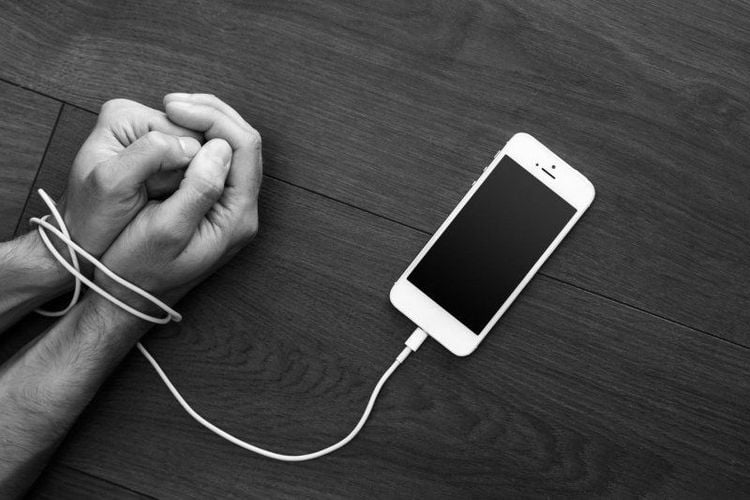This is an automatically translated article.
The article was professionally consulted by Dr. Le Thu Phuong - Department of Pediatrics - Neonatology - Vinmec Hai Phong International General Hospital.More and more parents let their children use smartphones to make them obediently sit still, but does this “babysitter” always teach your children good things? When children use social media and electronic devices in general, even a few minutes online can cause problems.
1. The problem of children using phones and social networks
Today, most parents post pregnancy and birth announcements on social media, set up profiles for their unborn children, and share all the joys and sorrows of parenthood. Internet. Therefore, it is not surprising that children are also being sucked into Tiktok or Youtube. Many parents think social media is a teen and teen problem, and assume that their little one just likes to play games and watch videos.According to a survey of more than 1,000 families, nearly half of children aged 5-8 know how to access social networks and one in five children who use mobile phones have their own accounts. Many 5-year-olds are more attracted to online games with real players than offline, and they also love watching gaming videos on YouTube - a social media site. Kids are also excited to connect with friends on Tiktok and Instagram. You may not know it, but in the minds of today's teenagers, "Facebook is for the elderly".
It may not be a big deal for a 6-year-old to ask to play online games with friends. However, opening the door for your child to the world of social media risks leading to a host of problems: cyberbullying, hacking or kidnapping, sexism, inappropriate images, running out of time. for family, friends, school assignments and other hobbies.
Some apps and websites require parental permission when children under 13 sign up for an account and limit data content. Sites like Facebook and Instagram don't allow children under 13 to join, but they can easily fake their age to open an account.
As a parent, you first need to find out what children in general and your children usually do on the internet. You can then talk to your child about the potential pitfalls of social media, while just encouraging them to form healthy habits and appropriate behaviour.

2. When parents post their kids on social media
Some parents created Facebook accounts for their children when they were 1 month old (by giving false birth dates). They use this account as an online diary, to keep memories for their children. Some people are more careful by avoiding posting sensitive posts, like videos of babies cutting the umbilical cord or learning to sit on the potty. Instead, they mostly post cheerful, happy images.While this is a growing trend, your child may not want this, especially when their friends start to notice. Around the age of eight, your child may feel nervous because he is afraid of being embarrassed with his friends. Therefore, parents should always be careful about setting up privacy, as well as showing their children what to post online to reassure them.
Of course, some parents are more discreet. One in five parents surveyed don't post anything about their children - because of privacy concerns, but also because they're too busy or don't care. In general, young parents are comfortable sharing family information on social media, while older parents (age 35 and up) are more reserved. But for parents who completely say no to social networks, they will have more surprises when their children start participating in this virtual world.
Parents of young children are often confident that they can monitor their children's use of social media and manage their children's use of phones in general, but this ability decreases and disappears when the child turns 17. In one study , about 80% of parents with children aged 10-12 admit they cannot track their children's online activities.
For example, a parent in the US didn't think her 8-year-old son had a social media account until he discovered he was playing his favorite online games with classmates and strangers. The mother thought the boy was only playing online with his friends, but in fact he had come into contact with "thousands of people".

3. The risks when children use social networks
Potential pitfalls for children online include:Strangers and exploitation This was a top concern for families participating in the survey. However, parents often trust their children to be safe and smart online. The problem is that a third of parents don't teach their children how to stay safe on social media.
Porn, violence and other inappropriate content Children are likely to encounter language and behavior that you would never want them to be exposed to. Even an inadvertent search suggestion can lead to age-inappropriate images, games, and videos that are surprisingly violent.
Cyberbullying, peer pressure, and irony Classmates all form groups online for discussion and children can feel left out. Content, conversations, and posts that parents often don't see, open the door to mean and mean behavior. In the extreme, social media is just a place for bullies to look down on other kids.
Privacy, poor judgment and long-term consequences With less supervision, children using social media tend to experiment with other behaviors and personalities that they would never risk at home, but The risk is very high. If a kid swears, jokes about something he shouldn't, or foolishly posts a picture of his bare bottom, that mistake can follow them for a long time.
The Harms of Smartphone and Social Network Addiction Games, videos, social networks and other types of media can be distracting and addictive, detracting from your child's enjoyment of school, activities and activities. action and friends in real life. Experts are especially worried about computer/phone screens taking away the strong parent-child bond and displacing imaginative, realistic play at a young age. important development. The most important thing for children aged 5-8 is to play with friends in real life, not online interactions.

4. Strategies to monitor your child's social media use
About half of the parents who participated in the survey had set ground rules when their children were on their phones, but were less proactive in monitoring their children's use of social media. Here are some strategies you can consider:Ask your child about games and websites that interest him or her. Find out if your child is connecting and messaging with friends or other online players. Sit down together and let your child show you how to play and supervise in the spirit of learning. Don't forget to ask other parents what their children are playing to keep up with the current popular trend among young people, and learn how to monitor their children's use of other families' social media. Join all the social networks your child uses and make friends with them. If you notice your child is rarely active, be aware that he may have set up another account without your knowledge. Place electronic devices, such as phones, computers, and TVs, in common areas of the home, such as the kitchen or living room. Children are not allowed in separate bedrooms. Let your child know your decision to manage your child's use of the phone. Make it clear that you will regularly review messages, conversations, and other activity and then do what you say. Set up controls, like checking device, website and app settings, and software downloads. Many games for kids have parental dashboards that help you adjust permissions for chats, messaging, and more. Ask your child to agree to the rules you set when using the Internet, including limiting screen time and accepting consequences for breaking them.

5. Help your child develop healthy online habits
Even adults make mistakes on social media and maybe kids too. But you can reduce your child's risk of making mistakes by setting requirements, encouraging good behavior, and explaining essential concepts. Namely:Talk about privacy Explain that what you privately share with someone online can also be easily transmitted around, intentionally or by mistake - and cannot be deleted. List out personal information that should never be shared when your child uses social media, including name, address, phone number, and date of birth.
Remind children to be kind and careful. Behave online the same way in real life. Some parents tell their children not to post things online that they wouldn't want to tell their grandma in real life.
Discuss cyber threats Explain that children need to tell an adult about any bad behavior in order to work it out together. Teach them not to use technology to hurt someone.
Talk about strangers Don't "make friends" with people you don't know. If a stranger disturbs your child, tell an adult right away. It may be okay to chat with other people on children's sites and games, but outside of those sites, never chat, text, or email with strangers.
Do not be exposed to inappropriate images and language Do not chat in rude or emotional language, do not send or receive pictures of people without clothes. Tell your parents if something is wrong.
Finally, make sure that when children use social media, they can confide in their parents if they are upset or worried about something. Don't keep secrets and refuse to accept help from adults just for fear of getting into more trouble.
Social media is a "double-edged sword". If used correctly, social networks also bring certain benefits to children. On the contrary, if abuse can leave many consequences, psychological problems in children.
If parents have difficulties in caring for and psychological education for their children or you suspect that your child is showing signs of phone addiction, dependent on social networks, you can go to Vinmec International General Hospital to examination. Here, you will receive support and counseling, as well as psychological intervention, behavior change (if needed) from pediatric psychiatrists and experienced psychologists. and seek advice from doctors as well as psychologists.
Please dial HOTLINE for more information or register for an appointment HERE. Download MyVinmec app to make appointments faster and to manage your bookings easily.
Reference source: babycenter.com














